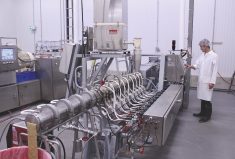The Annapolis Valley in Nova Scotia, an hour north of Halifax, seems an unlikely place to find a thriving winery making world-class wines from locally grown grapes. But Benjamin Bridge, which began as a passion project for the founders 25 years ago, has grown into a successful and innovative winery.
Keltie MacNeill is the director of sustainability and community engagement at Benjamin Bridge Winery and the niece of the founders, lawyers Gerry McConnell and the late Dara Gordon. She explains that Gerry and Dara set out to learn what kind of wine the land’s unique combination of soil, weather, sun and heat units could produce.
The partners in life and business researched and hired wine experts from Ontario and France and determined that their terroir (i.e., the environmental factors that affect a crop’s growth and development, and the specific characteristics that results from those factors) could produce excellent crisp sparkling white wines using traditional, Champagne-style methods.
Read Also

Sibling squeeze part 6: The emotional stakes of a family legacy
The final instalment in a six-part series exploring the challenges of sibling conflict and the effect it can have on…
But getting the winery up and running was a long-term proposition. From planting the vines, to harvesting the first grapes, making and then aging the wine, it took ten years to produce the first vintage. In the meantime, MacNeill says they released a low-alcohol summer wine called Nova 7 in 2008 “just for fun.” That wine turned out to be a big hit and has been the number one best-selling wine in Nova Scotia for a decade. Available across Canada, this wine is now a huge part of the winery’s portfolio and provides stability while they develop other wines.
In addition to producing award-winning wines, MacNeill says Gerry and Dara made it their mission to create a winery that would be sustainable and a positive addition to the community and landscape.
They wanted to become a “community-based winery.”

When the founders’ twin daughters, Ashley and Devon McConnell-Gordon, took over in 2010, the winery wasn’t open to the public, explains MacNeill, who joined her cousins in the business shortly after they took over. Since then, the twins have been “slowly and intentionally” building on the original vision. For example, they’ve expanded the winery’s programming from a small private tasting room to hosting many public events for all ages throughout the year.
Today the focus is on “creating a warm, welcoming environment in the Nova Scotia way,” says MacNeill. “It’s not about status. It’s about agriculture, it’s about community… the wines are world-class but not un-approachable.”
People first
The 170-acre winery has grown from a very small winery to one that employs 50 full-time staff and 50 seasonal workers. MacNeill says everything is done in-house from growing grapes and making the wines, to bottling and distribution. Sixty-five per cent of their ingredients are sourced from within an hour’s drive and MacNeill says they are always looking for ways to increase that percentage.
Although Ashley and Devon are in charge, MacNeill says the winery is run more like a collective with higher-level decisions made collaboratively by the eight or nine senior managers who each operate a department. “The small team at the top is in the loop about everything going on at the winery,” she says.
“They work on consensus-based decision-making with a lot of discussion,” says MacNeill, noting that women make up 85 per cent of the leadership team (as well as across the business), which is unusual in both agriculture and wine. “We will have very long meetings discussing topics until no one has any concerns,” she says, acknowledging that it’s not a management style for those who just want to jump in and get things done. However, she finds there is more buy-in, more autonomy and more accountability with this system.
Benjamin Bridge’s “people-first” ethos has been front and centre since the very beginning, says MacNeill. For example, to maintain life balance they’ve adopted a four-day workweek. They also supply a comfortable place for mothers to breastfeed.

MacNeill describes the winery’s organization as a “level hierarchy” where the gap between the highest and lowest paid workers is very slim. “Everyone has their roles defined but everyone moves where help is needed including the twin sisters who work in the business day-to-day, shoulder-to-shoulder with everyone else.” Their “open-book management” style hinges on a commitment to transparency, another value they’ve followed since the winery’s inception, she says.
Recently, Benjamin Bridge achieved its B Corp Certification, a designation that indicates a business is meeting high standards of verified performance, accountability and transparency on factors from sustainability to employee benefits, community support, supply chain practices and input materials.
MacNeill says they chose this particular certification because “it really spoke to them” as a way of expressing their values to their customers, the community and their team members in a holistic way. When she looked into what was required to meet B Corp Certification, she realized many of the requirements had already been met but were not yet enshrined in the winery’s policies.
She says they also take pride in the economic prosperity they have created in the Gaspereau Valley, a small valley within the Annapolis Valley. “Those are 50 jobs that weren’t there before,” she says. And in a region with historically low incomes, this rural economic development also draws tourists to the region.
Community building
MacNeill says that for the past decade, the winery has focused on social values which include collaborating with community groups and progressing on diversity, equity and inclusion (DEI) initiatives. She admits it can be difficult and overwhelming for a small business to find its way with DEI but they have learned you get there by having conversations and building relationships with the community. “It can be intimidating but the most important thing is to start and to start small, building slowly and intentionally with community resources. You’re going to make mistakes but it’s that active learning piece that’s important.”
As part of active reconciliation, the winery, has established a relationship with the nearby Glooscap First Nation. This collaboration resulted in a very successful Beyond Terroir event which was held for five years. And, through many thoughtful conversations, a popular wine has also been developed. The winery covers the cost of production while the shared profits support meaningful initiatives in the community. “We feel like we’re including Indigenous voices even though we’re not Indigenous ourselves,” says MacNeill.
Benjamin Bridge has also reached out to other community organizations, such as the Valley African Nova Scotia Development Association, through which senior management participated in anti-racism training workshops.
Building resilience to climate change
Incidences of hail, early and late frosts, droughts, cold snaps, and now forest fires have increased and are here to stay, says MacNeill. To survive the increasingly erratic weather, the winery is making changes to what they produce and how they produce it.
“Climate chaos is not for the weak,” she says. “Crops have to be more resilient and we have to be prepared to pivot.” Sourcing grapes from local growers spreads the risk as not all geographic locations will experience the same damaging weather. Changes to their production methods, such as non-vintage wines made by blending wines from multiple years instead of from a single year’s harvest, also “provides a little insurance,” MacNeill says.
“We need to be prepared for anything, to be agile and flexible,” says MacNeill, adding that they stay up to date on the latest science by participating in studies at the local university. They also ensure their voices as farmers are heard by participating on climate change panels.
Working together
Twenty wineries and about 60 grape growers comprise Nova Scotia’s small wine industry. MacNeill says working together by sharing equipment and developing growing techniques for the unique terroir of their region is essential to the success of the fledgling industry.
Annapolis Valley conditions produce great wines with naturally high acidity (Nova Scotia’s unique flavour profiles are recognized by the appellation “Tidal Bay”), but MacNeill says their growing conditions are much wetter than the dry soils of the Middle East where wine grapes originated. Techniques used to combat excess moisture include tile-draining the land, trellising systems that maximize ventilation and solar exposure, and spraying to control moulds and mildews. Development of hybrid grapes unique to Nova Scotia with better winter hardiness, such as l’Acadie Blanc, have also contributed to the industry’s success.
Producing the signature wines with the delicate flavours and natural acidity that the region is known for requires late-season harvest, in October or even into early November. “This is what put us on the map. That’s what you taste that can’t be replicated elsewhere,” says MacNeill. It also means gambling that the weather will hold until harvest is complete.
Looking toward the future
Benjamin Bridge is a trailblazer of non-alcoholic wines and an increased demand for non-alcoholic beverages means there is a good business case for producing zero-alcohol and low-alcohol wines. This also fits into their mission to be more inclusive. “It’s the fastest-growing sector of the market and a lot of fun,” says MacNeill.
Offering year-round events and drop-in wine service on the open-air terrace also capitalizes on the growing demand for agri-tourism, says MacNeill. “We have wonderful experiences that we offer on the farm for connecting to nature and to the farm.”
MacNeill says they will keep looking for the small wins and for ways to innovate. “Innovation is in our blood. It’s about continuous change. It’s about the long game.”
















